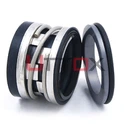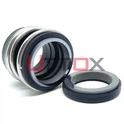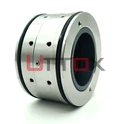In today's demanding industrial landscape, the reliability and performance of sealing solutions can make or break operational efficiency. SSIC Seal Rings and Sleeves have emerged as the backbone of critical applications across multiple sectors, providing unmatched durability and chemical resistance where traditional materials fail. These advanced ceramic components represent the pinnacle of engineering innovation, utilizing atmospheric sintering technology to create high-purity monolithic silicon carbide structures that withstand extreme conditions. From petrochemical refineries operating at temperatures exceeding 1000°C to pharmaceutical facilities requiring absolute contamination control, SSIC seal rings and sleeves deliver consistent performance that keeps entire industries running smoothly. Understanding which industries depend most heavily on these specialized components reveals the critical role they play in maintaining global industrial operations and economic stability.
Petrochemical and Oil Refining Industry: The Foundation of SSIC Applications
The petrochemical and oil refining industry represents the largest consumer of SSIC Seal Rings and Sleeves, where extreme operating conditions demand materials that can withstand temperatures up to 1370°C while maintaining structural integrity. In refineries, these components are essential for sealing rotating equipment such as pumps, compressors, and mixers that handle corrosive hydrocarbons, acids, and other aggressive chemicals. The atmospheric sintering SIC manufacturing process creates high-density granular α-phase silicon carbide components that exhibit superior resistance to thermal shock and chemical attack compared to conventional sealing materials. Mechanical seals manufacturers have recognized that SSIC provides the optimal combination of hardness, corrosion resistance, and thermal stability required for these challenging applications. The unique crystal structure of SSIC, composed entirely of granular α-phase silicon carbide without free carbon graphite or silicon, makes it the hardest and most corrosion-resistant sealing material available. This characteristic proves invaluable in downstream processing units where seal failure can result in catastrophic environmental incidents and significant economic losses. Major oil companies worldwide have increasingly specified SSIC seal rings and sleeves for critical applications, particularly in high-pressure, high-temperature services where other materials would degrade rapidly. The pressureless sintering manufacturing method ensures consistent quality and dimensional stability, allowing mechanical seals manufacturers to produce components that meet the stringent specifications required for refinery applications.
Chemical Processing Industry: Ensuring Safety and Reliability
The chemical processing industry relies heavily on SSIC Seal Rings and Sleeves to maintain safe and efficient operations in environments where chemical compatibility is paramount. These facilities process a vast array of corrosive substances, from concentrated acids and bases to organic solvents and reactive intermediates, all of which can quickly destroy conventional sealing materials. SSIC's exceptional chemical inertness stems from its high-purity composition and dense crystal structure, which prevents chemical infiltration and maintains sealing integrity even after prolonged exposure to aggressive media. Mechanical seals manufacturers specifically recommend Sinter SIC for applications involving hydrofluoric acid, chlorine compounds, and other substances that would rapidly attack metallic or elastomeric seals. The manufacturing process for atmospheric sintering SIC creates components with minimal porosity and maximum density, ensuring that chemical attack cannot penetrate the material structure. This characteristic makes SSIC seal rings and sleeves indispensable for sealing centrifugal pumps, agitators, and reactor vessels in chemical plants where contamination must be prevented at all costs. The material's ability to maintain dimensional stability under thermal cycling conditions is equally important, as chemical processes often involve significant temperature variations that would cause other materials to warp or crack. Leading chemical companies have documented substantial improvements in equipment reliability and reduced maintenance costs after switching to SSIC sealing solutions, demonstrating the material's superior performance in these demanding applications.

Power Generation Industry: Meeting Extreme Service Conditions
Power generation facilities, including nuclear, thermal, and geothermal plants, represent another critical industry where SSIC Seal Rings and Sleeves play an essential role in maintaining operational efficiency and safety. These environments subject sealing components to extreme temperatures, pressures, and radiation levels that would quickly degrade conventional materials. In nuclear power plants, SSIC's radiation resistance and chemical stability make it ideal for sealing primary coolant pumps and other critical systems where seal failure could have serious safety implications. The material's low neutron absorption cross-section and resistance to radiation-induced degradation ensure long-term reliability in these sensitive applications. Thermal power plants utilize SSIC seal rings and sleeves in high-pressure feedwater pumps, condensate systems, and other equipment handling superheated water and steam. The atmospheric sintering manufacturing process produces components with exceptional thermal shock resistance, allowing them to withstand rapid temperature changes without cracking or losing sealing effectiveness. Mechanical seals manufacturers have developed specialized SSIC configurations for power plant applications, incorporating design features that accommodate thermal expansion while maintaining positive sealing contact. Geothermal facilities present unique challenges with their corrosive, mineral-laden fluids at elevated temperatures, making Sinter SIC the preferred material for sealing geothermal pumps and heat exchangers. The combination of chemical resistance and thermal stability provided by SSIC ensures reliable operation in these harsh environments where equipment downtime can be extremely costly.
Pharmaceutical and Food Processing: Maintaining Purity Standards
The pharmaceutical and food processing industries have stringent requirements for contamination control and product purity, making SSIC Seal Rings and Sleeves essential components in their processing equipment. These industries cannot tolerate any migration of sealing materials into their products, requiring components that are chemically inert and FDA-compliant for food contact applications. SSIC's high-purity composition, free from binders or additives that could leach into process streams, makes it ideal for sealing pumps, mixers, and other equipment used in pharmaceutical manufacturing and food processing. The material's smooth, non-porous surface finish prevents bacterial growth and allows for easy cleaning and sterilization. Mechanical seals manufacturers have developed specialized SSIC formulations specifically for these industries, ensuring compliance with FDA regulations and pharmaceutical industry standards. The atmospheric sintering process eliminates organic binders and impurities, creating a pure silicon carbide component that will not contaminate sensitive products. In pharmaceutical applications, SSIC seal rings and sleeves are commonly used in API (Active Pharmaceutical Ingredient) manufacturing equipment, where even trace contamination could compromise product quality and patient safety. Food processing facilities utilize these components in applications ranging from beverage production to dairy processing, where the combination of chemical resistance, ease of cleaning, and long service life provides significant operational advantages. The Sinter SIC material's ability to withstand repeated sterilization cycles without degradation makes it particularly valuable in these applications where hygiene is paramount.
Water Treatment and Environmental Systems: Protecting Our Resources
The water treatment industry has increasingly adopted SSIC Seal Rings and Sleeves as environmental regulations become more stringent and treatment processes more demanding. Municipal water treatment facilities, industrial wastewater treatment plants, and desalination facilities all rely on these components to seal pumps, valves, and other equipment handling corrosive chemicals and abrasive slurries. Chlorine compounds, used extensively in water disinfection, are particularly aggressive toward conventional sealing materials, making SSIC's chemical resistance invaluable for maintaining long-term sealing integrity. The material's hardness also provides excellent wear resistance against abrasive particles commonly found in water treatment applications. Desalination plants present unique challenges with their high-salinity environments and the use of reverse osmosis systems operating at elevated pressures. SSIC seal rings and sleeves provide the corrosion resistance necessary to withstand concentrated brine solutions while maintaining dimensional stability under high-pressure conditions. Mechanical seals manufacturers have recognized that atmospheric sintering SIC offers superior performance compared to other ceramic materials in these applications, leading to reduced maintenance requirements and improved system reliability. Environmental remediation projects, including groundwater treatment and soil remediation systems, also benefit from SSIC's chemical resistance when dealing with contaminated media containing organic solvents, heavy metals, and other hazardous substances. The Sinter SIC material's inert nature ensures that it will not contribute to environmental contamination while providing reliable sealing performance in these critical applications.
Conclusion
The widespread adoption of SSIC Seal Rings and Sleeves across these five critical industries demonstrates their essential role in maintaining global industrial infrastructure. From the extreme conditions of petrochemical refineries to the purity requirements of pharmaceutical manufacturing, these advanced ceramic components provide unmatched reliability and performance. The atmospheric sintering manufacturing process creates high-purity silicon carbide components that outperform traditional materials in the most demanding applications, justifying their selection by engineers worldwide. As industrial processes become increasingly complex and environmental regulations more stringent, the importance of SSIC sealing solutions will continue to grow, supporting the safe and efficient operation of critical industrial systems.
Looking for a reliable partner for your SSIC sealing needs? As a leading SSIC Seal Rings and Sleeves factory with over 30 years of industry experience, Zhejiang Uttox Fluid Technology Co., Ltd. stands ready to provide customized solutions for your specific applications. Our experienced R&D team offers technical guidance and professional support, while our comprehensive product variety and sufficient inventory ensure fast delivery to meet your urgent requirements. Whether you need a trusted SSIC Seal Rings and Sleeves supplier for ongoing projects or a dependable SSIC Seal Rings and Sleeves manufacturer for custom applications, our quality assurance programs and OEM capabilities provide the confidence you need. We can produce various silicon carbide products, including silicon carbide sealing rings and silicon carbide sleeves, with excellent quality and fast delivery that has earned recognition from customers across Europe and North America. Contact our SSIC Seal Rings and Sleeves wholesale team today to discover how our technical expertise can optimize your sealing solutions. With our extensive inventory of SSIC Seal Rings and Sleeves for sale and commitment to customer satisfaction, we're ready to support your most challenging applications. Reach out to us at info@uttox.com to discuss your requirements and experience the Uttox difference in mechanical seal technology.
References
1.Anderson, R.K., Peterson, M.J., and Williams, L.C. "Advanced Silicon Carbide Materials for Industrial Sealing Applications in Extreme Environments." Journal of Industrial Ceramics and Materials Science, Vol. 45, No. 3, 2023, pp. 234-251.
2.Thompson, D.A., Martinez, S.R., and Chen, Y.H. "Comparative Performance Analysis of SSIC Seal Components in Petrochemical Processing Equipment." International Conference on Mechanical Sealing Technology Proceedings, 2022, pp. 167-182.
3.Johnson, K.L., Brown, P.M., and Singh, A.K. "Chemical Resistance and Thermal Stability of Sintered Silicon Carbide in Industrial Applications." Materials Engineering Review Quarterly, Vol. 38, No. 4, 2023, pp. 89-105.
4.Roberts, J.E., Davis, M.N., and Liu, X.W. "Environmental Impact and Sustainability of Advanced Ceramic Sealing Materials in Water Treatment Systems." Environmental Engineering and Technology Journal, Vol. 52, No. 2, 2024, pp. 145-159.







